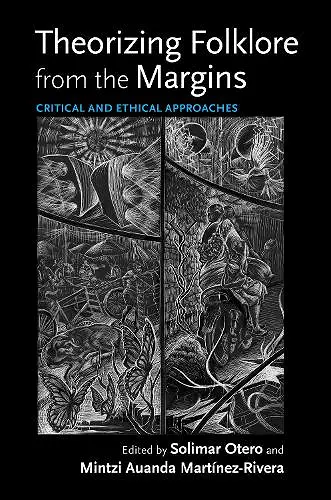Theorizing Folklore from the Margins
Critical and Ethical Approaches
Solimar Otero editor Mintzi Auanda Martínez-Rivera editor
Format:Paperback
Publisher:Indiana University Press
Published:15th Jun '21
Should be back in stock very soon

The study of folklore has historically focused on the daily life and culture of regular people, such as artisans, storytellers, and craftspeople. But what can folklore reveal about strategies of belonging, survival, and reinvention in moments of crisis?
The experience of living in hostile conditions for cultural, social, political, or economic reasons has redefined communities in crisis. The curated works in Theorizing Folklore from the Margins offer clear and feasible suggestions for how to ethically engage in the study of folklore with marginalized populations. By focusing on issues of critical race and ethnic studies, decolonial and antioppressive methodologies, and gender and sexuality studies, contributors employ a wide variety of disciplines and theoretical approaches. In doing so, they reflect the transdisciplinary possibilities of Folklore studies.
By bridging the gap between theory and practice, Theorizing Folklore from the Margins confirms that engaging with oppressed communities is not only relevant, but necessary.
"Theorizing Folklore from the Margins is an innovative collection of essays that maps the future of Folklore studies. This volume is indeed an important, relevant, ground-breaking contribution to Folklore scholarship. The polyphony of voices that composes Theorizing Folklore from the Margins argues that it is necessary to study the ways in which the creators of folk culture utilize their cultural production and expressions that allow them to create safe spaces that eventually become spaces for liberation and understanding of elements such as race, gender, sexuality, ethnicity, religion, (dis)ability, and national identity."—Guillermo De Los Reyes, Editor of Gender, Sexuality, and Policy; and author of Getting the Third Degree: Fraternalism, Freemasonry, and History, University of Houston
"Theorizing Folklore from the Margins actively resists monolithic notions attached to cultures and groups through a collection of powerful, multi-authored chapters and "proposes, invites, and offers alternative paths" in folklore studies. This stellar, thought-provoking volume reminds us authority rests with the voices of the people positioned at the margins and that the margins are alive con poder y cultura (with power and culture) and thriving because of it."—Wanda Addison, Professor, Department of Arts and Humanities, National University
"Theorizing Folklore from the Margins is the book I have wanted since the moment I first learned folklore was a thing. Solimar Otero and Mintzi Martinez-Rivera have assembled a collection that does more than reposition BIPOC theorizing from the margins to the center; it demonstrates that our theory has always been central to a more historically aware, self-critical, and ethically grounded folklore project. Further, this book shows us that the contributions of marginalized communities to critical theoretical conversations are not new. This book, then, is a bridge between the past, present, and future of a renewed Folklore studies in which those once silenced voices demand and deserve a new audience."—David Todd Lawrence, coauthor of When They Blew the Levee: Race, Politics, and Community in Pinhook, Missouri, University of St. Thomas
"This powerful collection of 16 critical essays takes aim at the myriad forms in whichhate, violence, othering, disenfranchisement, etc., manifest in social life as the resultof dominant power structures supported by the "legacies of white supremacy,homophobia, misogyny, xenophobia, ableism, and other injustices and forms ofdiscrimination" (19). It is these power structures, among others, that have keptcertain individuals and communities at the margins. The "margins," as presented in thebook, vary by author and range from the physical (such as prisons) to the symbolic (asin the intersections between methodologies and ideas). . . . The result is an illuminating, moving, and reflexivity-inducing work that takes us into and through very different marginal worlds "among, and with, Mexican, Wolof, Native American, Cuban, Puerto Rican, Haitian, Martinican, Andean, North American, African Diaspora, and LGBTQI folk cultures and communities"(13)."—Julián Antonio Carrillo, University of New Mexico, Journal of Folklore and Education
ISBN: 9780253056078
Dimensions: unknown
Weight: 544g
352 pages